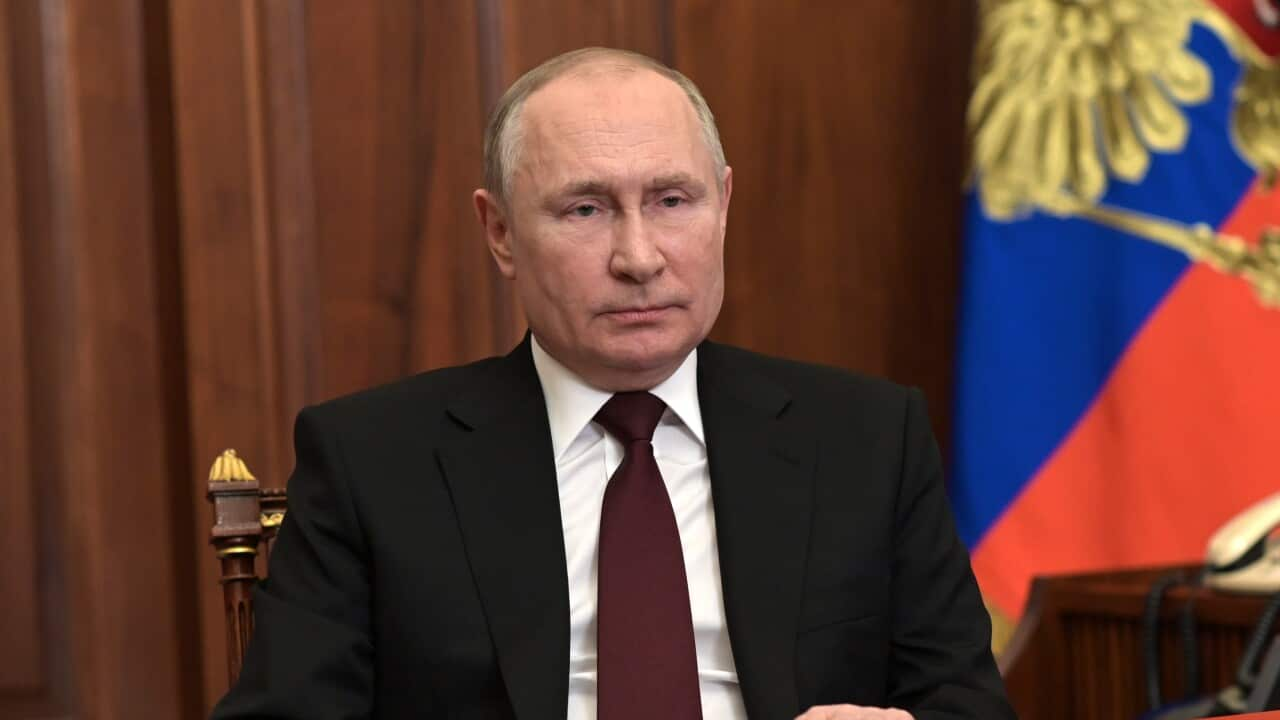Prime Minister Scott Morrison has announced Australia will impose sanctions against Russia after President Vladimir Putin recognised two breakaway pro-Russia regions in Ukraine as independent.
"The invasion of Ukraine has effectively already begun," Mr Morrison told reporters on Wednesday.
"Australia always stands up to bullies and we'll be standing up to Russia ... Australia will immediately be placing sanctions on Russian individuals."
Mr Morrison said Australia will impose travel bans and targeted financial sanctions on eight members of Russia's national security council.
He said broader sanctions will be extended to the separatist Ukrainian regions of Donetsk and Luhansk, which have access to capital across a number of sectors including telecommunications, oil, gas and military reserves.
Sanctions will also be placed on Russia's state bank and banks with defence ties.
"Russia is behaving like thugs and bullies, and they should be called out as being thugs and bullies," Mr Morrison said.
"Tragically, the sheer force of that violence of the thug and bully is about to be impacted upon the people of Ukraine."
Mr Morrison warned a full-scale invasion of Ukraine could begin within the next 24 hours.
He said Australia has already begun taking action regarding cybersecurity and will prepare for counter-attacks.
He also flagged he's asked the immigration minister to accelerate the inclusion of Ukrainians to humanitarian visa applications to Australia.
Mr Morrison said his greatest concern is for Ukrainians and Australians of Ukrainian descent.
"We now live in a world where autocracies are seeking to have their way," he said.
"Liberal democracies have to stay together and so many other countries, even if they're not democracies, who do believe in principles of the sovereignty of states. We need to stand together, and Australia will always do that."
The decision came after Mr Morrison convened cabinet's national security committee as Western nations began to impose the first tranche of sanctions against Russia.
Australia has ruled out direct military assistance and is supporting Ukraine's cyber-capability. It has left the door open for technical military support but the prime minister declined to elaborate on what the term meant.
Mr Morrison spoke with Ukrainian Prime Minister Denys Shmyhal on Wednesday night.
According to a government statement, Mr Morrison affirmed Australia’s "unwavering commitment to Ukraine’s sovereignty and territorial integrity", and preparedness "to do more" for the country in cooperation with international partners.
Opposition Leader Anthony Albanese is backing Australia's decision to impose sanctions against Russia, saying it sent a clear message its actions would not be tolerated.
"All Australians stand united against Russian aggression and in support of the people and the country of Ukraine," he told reporters.
"The aggressor here is Vladamir Putin - it's not the people of Ukraine - it is Vladamir Putin and Russia."
Russia's Ambassador to Australia was questioned by media on Wednesday afternoon following his meeting with the secretary of the Department of Foreign Affairs, but did not respond.
As tension ramps up in eastern Europe, the federal government has again appealed for Australians to urgently get out of Ukraine.
So far, 184 nationals have registered with the embassy but as many as 1,400 are thought to still be in the danger zone.
Earlier, Foreign Minister Marise Payne said Australia was reviewing a number of options relating to Ukraine's pro-Russia breakaway regions Donetsk and Luhansk.
"We will use whatever tools we have available to us to the greatest degree to ensure that we are applying sanctions in conjunction with our counterparts," Senator Payne told the ABC.
She also reserved the right to summon or expel the Russian ambassador but says the focus remains on targeted sanctions.
"As to how we deal with diplomats, that's a matter I'll turn my mind to at an appropriate time," Senator Payne said.
The former British ambassador to Russia told the ABC previous economic sanctions have had little effect against the country, only knocking off around 0.2 per cent of GDP each year.
"They have certainly not been effective ... and while they've had little economic effect they have had zero policy effect," Anthony Brenton said.
"The Russians gather around their president when pressure from outside is coming at them and they've been pretty tough in their refusal to bend to Western economic pressure. I would expect exactly the same in the upcoming round of sanctions now."
Mr Brenton said Mr Putin isn't a rash actor, only engaging in limited and contained foreign policy actions that don't risk large Russian casualties.
"I know he is a very cautious man. He is not a man who takes uncalculated, unquantified risks," he said.
"He is not going to go for a very big scale invasion of Crimea, which would be a huge operation with vast potential downsides if it goes wrong, downsides including Putin potentially losing his job."
The former diplomat also cautioned against the use of inflated rhetoric as he holds out hope for a negotiated outcome.
"I'm an ex-diplomatic which means you never call a spade a spade," he said.
"You find soft language, you try to get tensions down, you try to get people talking in reasonable terms and hopefully an agreement emerges from that."
With AAP












